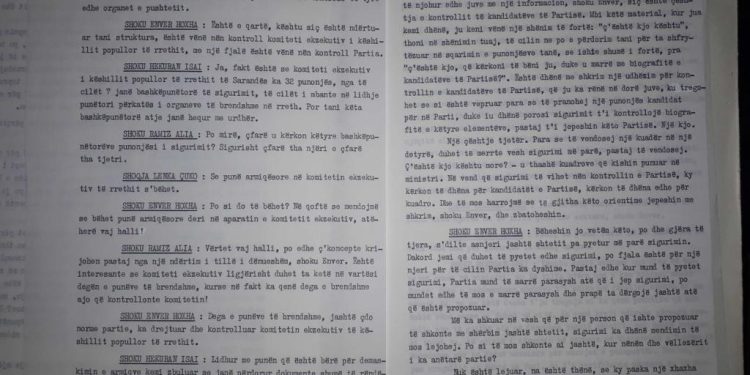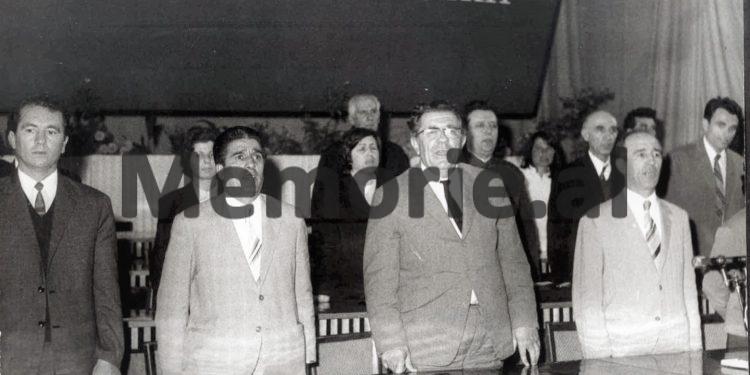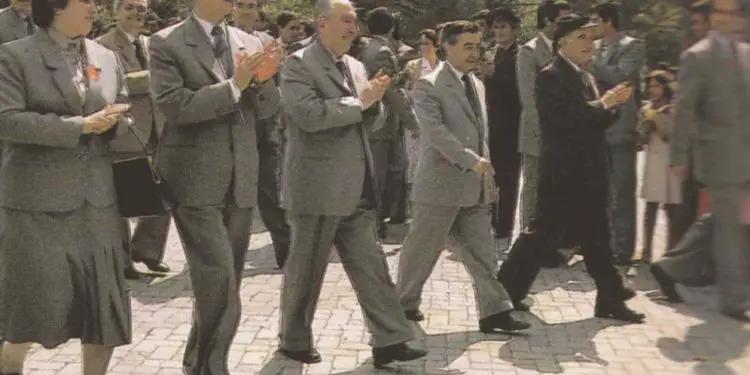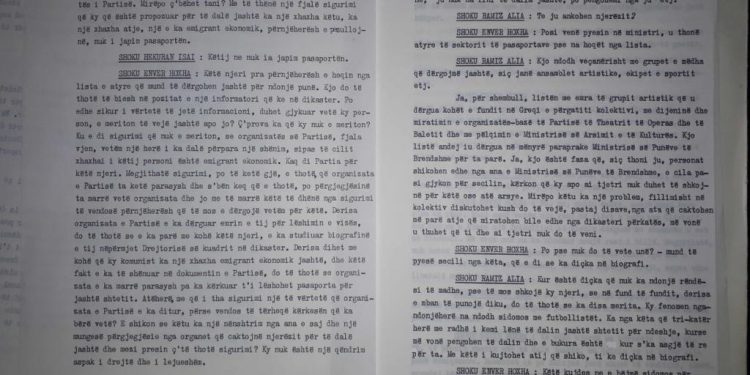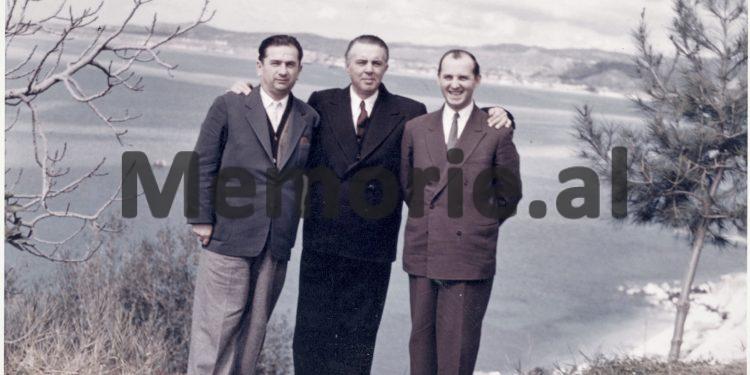Dashnor Kaloçi
Part fifteen
Memorie.al/ publishes some archival documents extracted from the Central State Archive in Tirana (Fund of the former Central Committee of PPSh), which contain the acronym “Secret” and “Top Secret” and belong to a period from January from 1982 until September 1983, where there is a voluminous file with minutes of meetings of the Secretariat of the Central Committee and the Political Bureau of the Central Committee of the PPSh, meetings which were chaired by its General Secretary, Enver Hoxha, where they assisted: Ramiz Alia, Adil Çarçani, Manush Myftiu, Hekuran Isai, Rita Marko, Pali Miska, Hajredin Çeliku, Haki Toska, Simon Stefani, Lenka Çuko, Muho Asllani, Vangjel Çerrava, etc., as the main topic is analysis about the “hostile activity” of Mehmet Shehu and his close collaborators, from Fadil Paçrami, Todi Lubonja, Beqir Balluku, Petrit Dume, Hito Çako, Abdyl Këllezi, Koço Theodhosi, Kiço Ngjela, Vasil Kati, Kadri Hazbiu, Fiqret Shehu, Feçor Shehu, Mihalla q Ziçishti, Llambi Peçini, etc. In the file available to Memorie.al, in addition to the analysis of the “hostile activity of the police agent Mehmet Shehu and his associates Beqir Balluku and Kadri Hazbiu”, in the meetings of the Political Bureau and the daily meetings of the Secretariat of the PPS Central Committee, are analyzed also the activity of the Ministry of Internal Affairs and State Security, with its agency and collaborators, inside and outside the country, the reports and relations of the Albanian state with different countries of the world, such as: the USA, the Soviet Union, West Germany, England, Spain, Italy, as well as those with neighbors, such as Greece and Yugoslavia and the demonstrations in Kosovo, how the world press presented Socialist Albania, the talks with West Germany about the War reparations payments, meetings and conversations with party leaders Marxist-Leninists from different countries of the world, such as Ernst Aust, Zhoao Amazonas, Fosko Dinuçi, etc., regarding the “suicide of Mehmet Shehu”, the problems of Polish immigration Albanian refugees, in different countries of the world, and the change of the exchange rate of the dollar in the remittances, which they made to their relatives in Albania, up to numerous economic problems, from heavy industry, hydropower plants on the cascade of the river Drin, energy import and export, etc., etc.
Continues from last issue
The “Top Secret” document with the minutes of the daily meeting of the secretaries of the Central Committee of the PPSh, held on September 10, 1983, where it was discussed: “On the conclusion of the trial of the remaining enemy elements from Beqir Balluk’s caste and on the necessity of renewing the framework in the Ministry of Internal Affairs and the bodies that depend on it”.
DAILY MEETING OF SECRETARIES OF THE CENTRAL PARTY COMMITTEE ON SEPTEMBER 10, 1983
Top Secret
In this meeting, in which Comrade Hekuran Isai also participated, it was first discussed about the conclusion of the trial of the remaining enemy elements from Beqir Balluku’s caste and the necessity of renewing the staff in the Ministry of Internal Affairs and the bodies that depend on her, for their education with a healthy party spirit, for the need to also carefully interweave old cadres with new ones in other bodies, on the necessity of establishing a party work in the bodies of Internal Affairs and on the care that must be taken to distinguish fair remarks from tendencies with hostile intentions, for the care of a preventive and healing work with people in the spirit of the party, for ensuring the leadership of the Party in the bodies of Internal Affairs, as well as for the structure and powers in the Security bodies.
COMRADE HEKURAN ISAI: Here, the fact is that the Executive Committee of the People’s Council of the district of Saranda has 32 employees, of which 7 are collaborators of the State Security who are kept in touch by the Operative Worker of the Internal Branch of the city. But now these associates there have been removed by order.
COMRADE RAMIZ ALIA: Well, what do you want from these collaborators, Security Operative Worker?! Of course, what one said and what the other said.
COMRADE LENKA CUKO: That hostile work is not done in the District Executive Committee.
COMRADE ENVER HOXHA: How will it be done?! If we think that hostile work is done up to the apparatus of the Executive Committee, then what is the problem?!
COMRADE RAMIZ ALIA: It’s really a problem, but what concepts are then created by such a reprehensible structure, Comrade Enver. It is interesting that, in fact, legally, the Executive Committee should have the Internal Branch subordinate, but now it turns out that it was the opposite.
COMRADE ENVER HOXHA: The Department of Internal Affairs, outside of any party norm, has directed and controlled the Executive Committee of the district People’s Council.
COMRADE HEKURAN ISAI: Regarding the work that was done to unmask the enemies, we discovered that very important documents were used by our bodies. I have found data that I have made known to you and to you, Comrade Enver, through a piece of information, such as the issue of the control of the Party’s candidates.
When we gave you this material, you made a strong note, where you said: “What is this thing”?! and we are using this note now to clarify our employees, that is: “What are you doing, dealing with the biographies of Party candidates”?!
A written instruction has been given for the control of Party candidates, which has fallen into your hands, showing how it was done before accepting an employee, a candidate for the Party, instructing the State Security to check the biographies of these elements and then give them to the Party. This one. The next issue.
Before a cadre was assigned to a task, the Security had to find out first, then he was assigned. What the hell is this?! I told you the cadres who had worked in the ministry. Instead of the State Security being put under the control of the Party, it asks for data on the cadres and candidates of the Party. And let’s not forget, Comrade Enver that all these guidelines were given in writing and implemented.
COMRADE ENVER HOXHA: Not only these but also other things were done. For example, no one could go abroad without first asking the Security. You agree that the State Security should also be asked, but only for people about whom the Party has doubts. That’s why even if safety is asked, the Party may or may not take into account the opinion of safety, and still sends that person abroad.
I have heard that a person who was assigned to go on service abroad, the Security has said, that he was not allowed. How could he not go abroad, when his mother and brothers are members of the Party?! It was not allowed, we were told that the latter had an uncle of the woman who had been with ‘Balli’ for three months. These data tell us now that I kept the Insurance. This means that State Security rejects all the merits of the communists who have joined the Party.
If these were without merit, the question arises as to why they were accepted as Party members?! These people have joined the Party because they have distanced themselves from hostile elements, because they have condemned their uncle who has been with the “National Front” for three or four months. This means that the Party had faith in these people that are why they were accepted in the Party. Well, the uncle has a blot on his biography, someone says.
And we deny them all their revolutionary contribution, as a family, for the sake of this stain in the biography and for an uncle with ‘Balli’?! We must therefore be flexible and balanced in our evaluations, otherwise we will not judge correctly. So such a man will be allowed to go out of the Party, and not the State Security, to ask for the opposite, questioning the entire patriotism of such a man’s family.
COMRADE HEKURAN ISAI: And in these cases, some people with such sectarian attitudes have brought us trouble, Comrade Enver.
COMRADE ENVER HOXHA: Yes, there have been cases that have come to my attention for attitudes of this nature.
COMRADE HEKURAN ISAI: This was thought by some who still work in the ministry, but I have returned such things to Comrade Enver, telling my friends to look at the issues as you teach us. And in this case, I explained to you how it was a wrong practice, which has not been fixed yet. Previously, the rule was completely different, for people who had to go abroad, and they sent them to the Ministry of Internal Affairs, to give their opinion on obtaining a passport.
And we, according to the rule that is in force, should verify before deciding on this. What is worse is that the departments fall to us to verify not only Party members, but also cadres of the nomenclature of the Secretariat, the Government, even those of the Political Bureau, such as the Deputy Ministers.
Since I went to the office, when I was asked for my opinion to allow these people of this category, to go out, I issued them their passports immediately, although as a rule, not even a fly could move out without first passing through our organs. By that I mean, we have a lot to see, I think.
COMRADE ENVER HOXHA: Do you give passports?!
COMRADE HEKURAN ISAI: Yes, we.
COMRADE ENVER HOXHA: And the Ministry of Internal Affairs gives them diplomatic passports?! For these only a note, enough to give the exit visa, should be made by you, and nothing else. For these issues, there should be a regulation on who is given a diplomatic passport, such as the deputy minister, the director, etc. And so when the proposal comes to the ministry, to release a person’s passport to go out, you have to immediately release the stamp.
COMRADE RAMIZ ALIA: And the one who issues the proposal will bear the responsibility.
COMRADE ENVER HOXHA: Until the relevant department sends the request to the Ministry of Internal Affairs, to issue the passport, when it is known that the person who will go abroad is a Deputy Minister or director, based on the official request, the document must be given to him immediately those interested.
You of the Ministry of the Interior, can only do something for low-ranking employees, when it is required that they must go out. Yes, you have the right to check them, and seeing that they don’t have runaways. Therefore, in these cases, the person making the proposal should be told that we also have this information about this person.
Then, responsible for recommending the exit of this person, is the basic organization where he works, or the relevant Party committee. But what happens now?! In a word, the State Security, that this one, who is proposed to go out, has an uncle here and an uncle there, one is an economic immigrant; they immediately suspend him and do not give him his passport.
COMRADE HEKURAN ISAI: We do not give him a passport.
COMRADE ENVER HOXHA: So, this man is immediately removed from the list of those who can be sent abroad for some work. This means that you fall into the position of an informer in your department. And even if the information is true, this person should be judged himself, if he deserves to go out, right?! What proof is there that he doesn’t deserve it?!
Where does safety know, that he does not deserve it, that the Party organization, the word goes, once came before a note that this person has an uncle who is an economic immigrant. That much the Party knows about this man. However, the State Security had something to say about the Party organization. And this is to take into account his own sending out, and not to take into account only the word of the Security employee.
Until the organization of the Party has proposed to leave this man, it has studied his biography well through the Personnel Directorate, in the relevant department. As long as it is known that this person has an economic immigrant uncle abroad, and this fact has been noted in the Party document, it means that the organization has considered the proposal to send this person abroad.
Then, since the State Security told a truth that the Party Organization knew, why does the latter decide to withdraw the request it made?! You see that there is a submission on her part and a lack of responsibility from the bodies that assign people to go out, and what are they waiting for the State Security to tell them?! This is an attitude that is not at all fair and permissible.
COMRADE HEKURAN ISAI: And then people come and complain to us that: “You don’t let us go out, we are getting in the way of you”, etc.
COMRADE RAMIZ ALIA: Do people complain to you?!
COMRADE ENVER HOXHA: Posi, later they ask the ministry, and they tell you to those in the passport sector, why did you remove us from the list?!
COMRADE RAMIZ ALIA: This happens, especially with the large groups that we send abroad, such as artistic ensembles, sports teams, etc. For example, the list of names of the artistic group that was recently sent to Greece was prepared by the collective, with the knowledge and approval of the basic organization of the Opera and Ballet Theater, and with the consent of the Ministry of Education and Culture.
This list is then sent to the Ministry of Internal Affairs for review. So this is the way, as you say, that the people who go out are looked at by the Ministry of the Interior. The latter, after sifting through them all, demands that one or the other, should not go out for this or that reason. But there is a problem here, that when the collective discusses the names that will go abroad, some later you are told that this or that one will not be allowed to go abroad.
COMRADE ENVER HOXHA: Why won’t I go?! Can say any of these, who know there is something in the biography.
COMRADE RAMIZ ALIA: When it’s something that doesn’t have any great importance, why shouldn’t this man go, after all, he works somewhere, so he has some merit. This phenomenon sometimes happens to us with footballers.
There are some of these who three or four times in a row, we have let them go abroad. But later, they are prevented from going out. And the best thing is that, when there is nothing new for them, they tell you, look, you have problems in your biography.
COMRADE ENVER HOXHA: We take this precaution especially because we don’t have anyone left there. However, we have not heard that any artist or athlete, who was sent to give a show or for a sports match, never returned. Yes, mother, if you look carefully at their biographies, there are those who have people in their families and tribes with impure biographies.
COMRADE RAMIZ ALIA: For such people, in some cases I and Hekurani have taken responsibility, and we have allowed them to be sent abroad.
COMRADE ENVER HOXHA: There are some of our artists who are not morally clean, there are also those who may have said some bad words and so on, but when they went out for it gave a performance, remained correct, and behaved well mobilized for the performance of the task for which they were sent.
COMRADE HEKURAN ISAI: None of us have escaped so far, although we have taken hundreds of these people.
COMRADE ENVER HOXHA: Yes, yes, that’s right, none of them have escaped. I remember only one case in the first years after liberation, when two footballers who had fled with their team to Istanbul, Turkey, did not return to us. Later, no such case happened to us.
However, it is not bad for these people to be checked by the Ministry of Internal Affairs, and let’s face it, we shouldn’t be liberals either.
COMRADE HEKURAN ISAI: No, no, in no way because they proposed to send us out, even people with a bad moral and political attitude.
COMRADE ENVER HOXHA: There are also people with bad makeup, who are waiting for the opportunity to go outside in order to do hostile work there. The moments we are going through, friends, are very difficult, so let’s not forget this. The enemies of our Party and People, with the liquidation of Mehmet Shehu’s traitorous gang, have become very angry and want and try to do something in Albania, to create difficult situations for us.
Therefore, we need to find ways to take such measures so that for the people we send abroad, such actions are made with a revolutionary meaning, both by the bodies that propose them, and by the Ministry of the Interior. There are people that the Ministry of the Interior does not know because it does not keep files on them, but there are others that it knows very well. Therefore, you should be very careful with these, and we advise you not to close your eyes.
When a ministry wants to take its people abroad, if they have problems, you have to signal it well and they take this signal into consideration. Then care must be taken not to propose anyone to a team without first studying the issue of candidacies abroad because we will face problems later.
If the Ministry of Internal Affairs signals that this artist, or this sportsman, should not go out because there are serious problems in the documents, then they should not be put on the list that will be discussed by the collective or organization. If the artist or athlete asks why he is not allowed to go out, find an excuse where he can be told, for example: “yes, you have gone abroad once or twice” etc. And so the matter is closed.
COMRADE HEKURAN ISAI: There are many cases of such accelerated actions by the departments, Comrade Enver, as they make proposals to us without careful work for the people who are thinking of sending them abroad. One day we talked about how to put this issue on track, and even drafted information.
Then a bad trend is noticed in the ministries, as they want to send as many people from their sector abroad as possible. For Party members, there is a practice that the enemies have implemented, and I think it should not be carried forward by us.
For this reason, we do not receive proposals on whether they should go abroad or not. I have returned the requests to the departments, because until the basic organization and the relevant department themselves decide on their case, why are we hindering them. I note something else that we, as a State Security agency, do not seem fair to us. Memorie.al
The next issue follows




